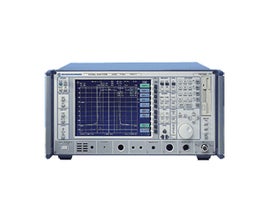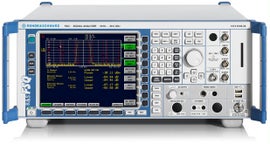Find Vector Signal Analyzers
Showing 1 - 4 of 4 results

Rohde & Schwarz FSIQ7 (1166.1660.08)
Spectrum Analyzer; 20kHz to 7GHz
Rent
Get QuoteBuy Used
EnquireSource New
Finance options available
Rohde & Schwarz FSQ8 (1155.5001.08)
Signal Analyzer, 20 Hz to 8 GHz
Rent
Get QuoteBuy Used
EnquireSource New
Finance options available
Rohde & Schwarz FSQ26 (1155.5001.26)
Signal Analyzer; 20 Hz to 26.5 GHz
Rent
Get QuoteBuy Used
EnquireSource New
Finance options available
Rohde & Schwarz FSIQ7 (1119.5005.17)
Spectrum Analyzer; 20kHz to 7GHz
Rent
Get QuoteBuy Used
EnquireSource New
Finance options availableShowing 1 - 4 of 4 results
Vector Signal Analyzers
About vector signal analyzers
Used for the measurement and characterisation of radio frequency signals in the spectral and time domain, vector signal analyzers (VSAs) are essential for testing wireless communication systems. These go beyond the capabilities of regular spectrum analyzers, which can only characterise a signal's frequency content. As the word 'Vector' in the name suggest, VSAs have the ability to analyze the direction or phase of the RF signal in addition to its amplitude.
Types of vector signal analyzers
Several different types of vector signal analyzers exist, offering a range of different features and purposes. For example, some VSAs are compatible with a larger range of frequencies for testing.
Additionally, while some VSAs allow you to adjust the sweep time for more stable results, others perform analysis of signals in real time.
Uses of vector signal analyzers
Vector signal analyzers are used to test and characterise RF devices and systems in a wide variety of different applications, for example developing and troubleshooting wireless communications and data transmissions system. These high-end signal nalyzers are also used in the aerospace and defence industry to evaluate the performance of radar systems, satellite communications, or other systems that use radio frequencies. Other sectors where vector signal analyzers are used include R&D, automotive, and medical device development and testing.
Frequently Asked Questions
What should I consider when choosing a vector signal analyzer?
There are a few key factors to consider when choosing a vector signal analyzer for your application. Firstly, the range of frequencies that the VSA can measure is key -- depending on the type of RF signals you want to measure you may need an NSA with a wider frequency range. Secondly, the analyzer's bandwidth should be considered. The bandwidth affects how much data can be captured in vector signal analysis, so it's important that you choose an analyzer with a large enough maximum bandwidth (measured in MHz) for your application. Thirdly, you will need to consider the dynamic range of the vector signal analyzer. For the accurate measurement of weaker signals, it's essential that you choose an instrument with a higher dynamic range. You might also want to consider the input power, amplitude range and phase noise performance of the instrument, depending on your particular application.
In addition to these important considerations, you will also need to think about factors such as cost, size and portability, and whether the interface is compatible with the equipment or software you use.
What is the difference between a vector signal analyzer and a spectrum analyzer?
While spectrum analyzers are more general-purpose devices used for general RF measurement and troubleshooting, vector signal analyzers are usually more complex and advanced instruments. This is due to the fact that spectrum analyzers can only analyse the magnitude of the signal in the frequency domain and cannot evaluate complex signal features such as modulation or phase. Meanwhile, vector signal analyzers can take measurements in both the frequency and time domains, analysing the phase, modulation, and amplitude of the RF signal.
Do VSAs generate signals?
No, vector signal analyzers are used for the measurement of existing signals and cannot generate new signals. If you need to generate a known signal for testing purposes, it is necessary to use a signal generator in addition to your VSA. Browse our full range of signal generators and vector signal generators to find the right device for your needs.
What are the benefits of renting a vector signal analyzer?
As high-performing specialist tools, vector signal analyzers often come with a high price tag. Renting a VSA is a cost-effective solution which allows you to access the latest industry-leading equipment at a fraction of the normal cost. With a range of rental terms that can be easily upgraded, changed, and returned, renting vector spectrum analyzers is a flexible solution that can work with your budget. Plus, there's no need to worry about equipment maintenance, calibration, or even eventual obsolescence when you rent an analyzer. Our expert team can provide you with all the support you need. Find out more about the benefits of our rental programmes here.
Are used vector signal analyzers high quality?
Yes, our Certified Pre-Owned VSAs have been attentively chosen, inspected, and calibrated as part of our 23-step certification process. This means that you can expect accurate and reliable results every time – as good as if the instrument was brand new. With major cost-savings and a one-year warranty on all our Certified Pre-Owned test and measurement equipment, buying used vector signal analyzers is a great, budget-friendly solution.
What VSA frequency ranges are available?
The range of frequencies that a VSA covers depends on the specific make and model. For example, the Rohde & Schwarz FSIQ signal analyzer family offers different models with ranges from 20 Hz to 3.5 GHz, 7 GHz, or 27 GHz, while some FSQ models offer a frequency range from 20 GHz up to 40 GHz.
What are the best vector signal analyzers?
While the best vector signal analyzer for you will depend on the type of application and your budgetary requirements, one of the highest-regarded VSA manufacturers is Rohde & Schwarz. R&S vector signal analyzers are known for being accurate and easy to use, offering a high dynamic range and wide range of frequencies, and even offering advanced analysis capabilities such as phase noise, modulation, and spectral analysis.
Need Help Problem-Solving?
Our Knowledgeable Team of Experts is Here to Help Guide You to the Best Product Solutions. Ask Us How.


